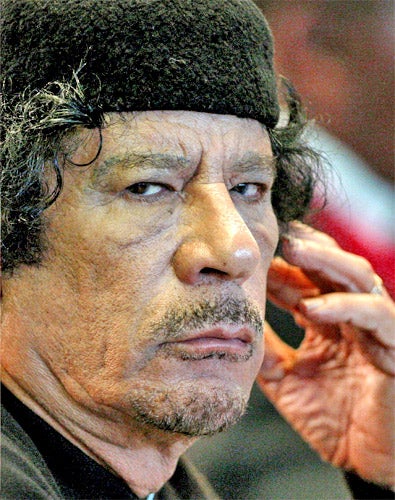Paul Peachey: Leaked cables reveal Gaddafi's iron grip on corrupt regime

Your support helps us to tell the story
From reproductive rights to climate change to Big Tech, The Independent is on the ground when the story is developing. Whether it's investigating the financials of Elon Musk's pro-Trump PAC or producing our latest documentary, 'The A Word', which shines a light on the American women fighting for reproductive rights, we know how important it is to parse out the facts from the messaging.
At such a critical moment in US history, we need reporters on the ground. Your donation allows us to keep sending journalists to speak to both sides of the story.
The Independent is trusted by Americans across the entire political spectrum. And unlike many other quality news outlets, we choose not to lock Americans out of our reporting and analysis with paywalls. We believe quality journalism should be available to everyone, paid for by those who can afford it.
Your support makes all the difference.For four decades, Muammar Gaddafi has toyed with his rivals and family in a skillful game of power politics that has allowed him to skim multimillion-dollar contracts to enrich allies and retain power, according to leaked diplomatic cables from the United States.
Despite carefully cultivating an image of an aloof "philosopher-king" above the political fray, Colonel Gaddafi has remained firmly in charge of a regime which has a stake "in anything worth buying, selling or owning", according to a 2009 cable released by WikiLeaks.
Painting a picture of a profoundly corrupt regime centred on the cult of Colonel Gaddafi's personality, US Ambassador Gene Cretz said in one cable that the aging autocrat personally reviewed all contracts involving Libyan government funds worth more than $200m (£123m).
Colonel Gaddafi's hold on power depended on his "mastery of tactical manoeuvring" in an essentially tribal society with no constitution and a decision-making process that remains a legacy of the revolution. The system is administered by an old guard whose livelihood depends on continued graft. Favoured regime officials were encouraged in their corruption and were so deeply implicated that Colonel Gaddafi could depend on their loyalty, according to the cables released this month.
Colonel Gaddafi has tried to give the impression that he was passing day-to-day decision making to one of his sons in an orchestrated succession. But Mr Cretz said that the dictator "remained intimately involved in the regime's most sensitive and critical portfolios". The cables suggested he has also taken a close interest in human rights causes and the process of political and economic reform. Colonel Gaddafi urged conservative elements of the regime not to oppose possible elections, according to one January 2009 wire.
The challenge for Colonel Gaddafi, the US diplomats believed, was to change the system run by a corrupt old cadre into a more transparent one in which more Libyans could play a part. But the unanswered question was always who would take on that process after he was gone. The manipulation of the system was not limited to his rivals and foes, but also extended to his family as he played potential successors off against each other.
Before the protests that had thrown the succession programme awry, business interests were lining up behind two of Colonel Gaddafi's sons – Saif al-Islam and Mutassim (described as "not terribly bright" by the Serbian ambassador) – who were seen as the most likely to take over from their father.
Without a clear succession plan, sibling rivalry was inevitable between Saif al-Islam, who cultivated an image as the acceptable face of Libya to the West and Mutassim, the national security adviser. Meanwhile, their sister Aisha –regarded by some as smarter than her brothers – has played no visible role in the succession battle. Last night, the UN Development Programme dropped her as a goodwill ambassador, with spokesman Martin Nesirky citing the crackdown on protesters. She was appointed to the post in 2009 to focus on combating HIV/Aids and violence against women.
Saif al-Islam has emerged as the favourite, though his fire-and-brimstone performance which echoed his father's rhetoric was widely derided by protesters and was the latest of a series of tactical failures. "Gaddafi has placed his sons... on a succession high-wire act, perpetually thrown off balance in what might be a calculated effort by the aging leader to prevent any one of them from gaining the prize," Mr Cretz wrote in November 2009.
Those growing rivalries "could play an important, if not determinative role, in whether the family is able to hold on to power after the author of the revolution exits the political scene", according to one cable, written when the question of an involuntary departure was not a foreseeable prospect.
A series of scandals, including the arrest of one son, Hannibal, for allegedly beating servants in a Switzerland hotel, has tarred the family and forced them into a series of attempted cover-ups. They have sent the family into a "tailspin", according to one cable a year ago.
But in a sign of the powerful grip that the family had over the affairs of the country, the children have carved out spheres of influence and were seemingly treating the country as their personal fiefdom.
Join our commenting forum
Join thought-provoking conversations, follow other Independent readers and see their replies
Comments